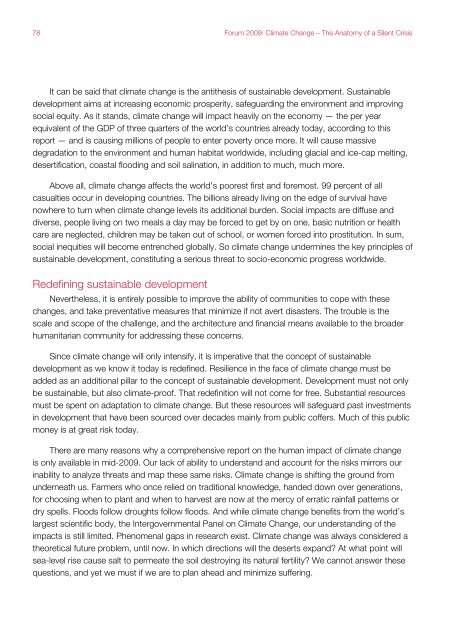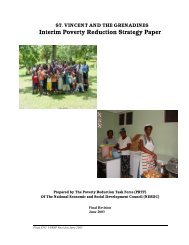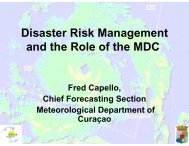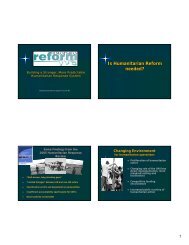The Anatomy of A Silent Crisis The Anatomy of A Silent Crisis
The Anatomy of A Silent Crisis The Anatomy of A Silent Crisis
The Anatomy of A Silent Crisis The Anatomy of A Silent Crisis
- TAGS
- anatomy
- www.bb.undp.org
Create successful ePaper yourself
Turn your PDF publications into a flip-book with our unique Google optimized e-Paper software.
78 Forum 2009: Climate Change – <strong>The</strong> <strong>Anatomy</strong> <strong>of</strong> a <strong>Silent</strong> <strong>Crisis</strong><br />
It can be said that climate change is the antithesis <strong>of</strong> sustainable development. Sustainable<br />
development aims at increasing economic prosperity, safeguarding the environment and improving<br />
social equity. As it stands, climate change will impact heavily on the economy — the per year<br />
equivalent <strong>of</strong> the GDP <strong>of</strong> three quarters <strong>of</strong> the world’s countries already today, according to this<br />
report — and is causing millions <strong>of</strong> people to enter poverty once more. It will cause massive<br />
degradation to the environment and human habitat worldwide, including glacial and ice-cap melting,<br />
desertification, coastal flooding and soil salination, in addition to much, much more.<br />
Above all, climate change affects the world’s poorest first and foremost. 99 percent <strong>of</strong> all<br />
casualties occur in developing countries. <strong>The</strong> billions already living on the edge <strong>of</strong> survival have<br />
nowhere to turn when climate change levels its additional burden. Social impacts are diffuse and<br />
diverse, people living on two meals a day may be forced to get by on one, basic nutrition or health<br />
care are neglected, children may be taken out <strong>of</strong> school, or women forced into prostitution. In sum,<br />
social inequities will become entrenched globally. So climate change undermines the key principles <strong>of</strong><br />
sustainable development, constituting a serious threat to socio-economic progress worldwide.<br />
Redefining sustainable development<br />
Nevertheless, it is entirely possible to improve the ability <strong>of</strong> communities to cope with these<br />
changes, and take preventative measures that minimize if not avert disasters. <strong>The</strong> trouble is the<br />
scale and scope <strong>of</strong> the challenge, and the architecture and financial means available to the broader<br />
humanitarian community for addressing these concerns.<br />
Since climate change will only intensify, it is imperative that the concept <strong>of</strong> sustainable<br />
development as we know it today is redefined. Resilience in the face <strong>of</strong> climate change must be<br />
added as an additional pillar to the concept <strong>of</strong> sustainable development. Development must not only<br />
be sustainable, but also climate-pro<strong>of</strong>. That redefinition will not come for free. Substantial resources<br />
must be spent on adaptation to climate change. But these resources will safeguard past investments<br />
in development that have been sourced over decades mainly from public c<strong>of</strong>fers. Much <strong>of</strong> this public<br />
money is at great risk today.<br />
<strong>The</strong>re are many reasons why a comprehensive report on the human impact <strong>of</strong> climate change<br />
is only available in mid-2009. Our lack <strong>of</strong> ability to understand and account for the risks mirrors our<br />
inability to analyze threats and map these same risks. Climate change is shifting the ground from<br />
underneath us. Farmers who once relied on traditional knowledge, handed down over generations,<br />
for choosing when to plant and when to harvest are now at the mercy <strong>of</strong> erratic rainfall patterns or<br />
dry spells. Floods follow droughts follow floods. And while climate change benefits from the world’s<br />
largest scientific body, the Intergovernmental Panel on Climate Change, our understanding <strong>of</strong> the<br />
impacts is still limited. Phenomenal gaps in research exist. Climate change was always considered a<br />
theoretical future problem, until now. In which directions will the deserts expand? At what point will<br />
sea-level rise cause salt to permeate the soil destroying its natural fertility? We cannot answer these<br />
questions, and yet we must if we are to plan ahead and minimize suffering.







